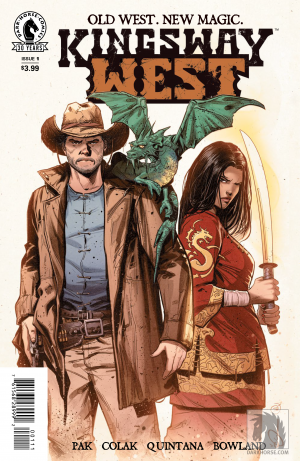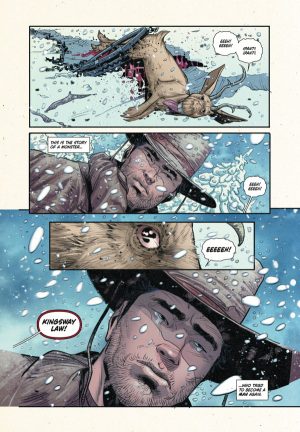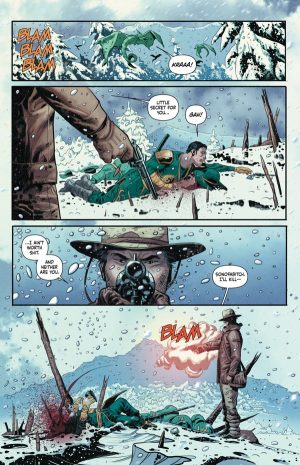The Western is one of the iconic genres of American fiction, both in print and on the screen. It is so iconic at this point that there has been a counter-wave of films and stories that change, subvert, or even parody the tropes of the western. Blazing Saddles might be the most famous of those, both for its brilliance and its outrageousness, but it sits alongside Spaghetti Westerns and films set in Mexico during the revolution. With all of this in mind, Zeb Larson talks to Greg Pak about his new series Kingsway West and the ways in which it embraces and subverts westerns.
 ZEB LARSON: Were you much of a western fan prior to this story? I saw that you’re from Texas, so it was probably kind of hard to get away from that western mythos. What kind of bearing did that have on your writing?
ZEB LARSON: Were you much of a western fan prior to this story? I saw that you’re from Texas, so it was probably kind of hard to get away from that western mythos. What kind of bearing did that have on your writing?
GREG PAK: I had a kind of classic outdoor American childhood in suburban North Dallas, camping and hiking with the Boy Scouts and riding bikes around with friends, exploring the woods, hunting cottonmouths in creeks, all that good stuff. So I always loved Westerns and other kinds of outdoor adventure stories like Kurosawa samurai movies and Lord of the Rings and Dungeons & Dragons.
Follow-up: Which westerns were you thinking about when you wrote this story?
GP: Some of my favorite Westerns include those classic Anthony Mann/Jimmy Stewart pictures like Naked Spur, Arthur Penn's Little Big Man, Zinnemann's High Noon, and George Stevens' Shane. Shane and High Noon blew my mind when I was young and kind of cemented in my mind that archetype of the stoic Western hero who does what needs to be done for a community that may or may not have a place for him in the end. Naked Spur was an amazing example of how a small, deeply personal story can work as a Western adventure. And Little Big Man thrilled me with its humor and tragedy and embrace of a much more multicultural vision of the Old West. I didn't model Kingsway West directly on any of these stories, but all of those movies opened my head up in beautiful ways about what a Western could do.
ZL: I have to ask: how much did role-playing games have an impact on how you wrote this story? I was reading it and thinking of Deadlands, but obviously, D&D could be a big thing too.
GP: I never played Deadlands, alas. But yes, I was a big D&D nerd as a kid, and that kind of adventure and world-building has definitely inspired me over the years. I got a kick out of seeing Ta-Nehisi Coates cite D&D as a big inspiration the other day on Twitter. I think that's probably true of a lot of us speculative fiction and fantasy writers.
 ZL: In the traditional American cowboy story, Mexicans are usually bandits and any Chinese characters are running a laundry or the like. How much of this story is a conscious attempt to shatter that mold?
ZL: In the traditional American cowboy story, Mexicans are usually bandits and any Chinese characters are running a laundry or the like. How much of this story is a conscious attempt to shatter that mold?
GP: Breaking stereotypes is a huge thing for me in general, and it definitely is a big part of what inspired me from the beginning with this project. I was a biracial Korean American kid growing up in Texas who loved Westerns. So when I learned about the actual history of Chinese immigrants in the Old West, I was so thrilled and inspired. I've wanted to tell a story about a Chinese gunslinger in the Old West for over two decades now. Almost hard to believe it's actually finally coming out!
ZL: It’s interesting that the central conflict (at least in the first issue) is between a Mexican faction and a Chinese faction. There are also little culturally specific nuggets: Jackalopes for the Americans, and dragons for the Chinese, for example. Is this an east-meets-west kind of story, or is their interaction more complicated than that?
GP: That's a great question. I honestly just think of it as an American story. The actual Old West was stunningly diverse, as was pretty much every era in American history. This book is just shining a light on folks that many Westerns don't tend to feature. I'm also finding myself thinking about the fact that horses went extinct in America in prehistoric times -- they were only reintroduced in the 15th and 16th Centuries. So horses, one of the most iconic symbols of the American West, are imports. So the dragons and jackalopes and bearfeet and antelopes and everything else in Kingsway West are all parts of a multicultural mythology that feels entirely American to me.
ZL: Americans in the nineteenth century (and today) genuinely believed in Manifest Destiny. I would have to think that having both a strong Mexican Republic and Chinese empire on their borders would shatter so many of those ideas…or make them even harder-edged. Will that be looked at all in this story?
 GP: Oh, yeah. On the last page of issue #1, we introduce some elements that indicate the world is much bigger and complex than you might have otherwise known, with other communities involved in key ways. Keep on reading, friends!
GP: Oh, yeah. On the last page of issue #1, we introduce some elements that indicate the world is much bigger and complex than you might have otherwise known, with other communities involved in key ways. Keep on reading, friends!
ZL: The time period, the 1860s, couldn’t help but jump out at me because of the American Civil War. Yet the Civil War wasn’t fought with Red Gold. Is there going to be any discussion of whether and how far our timelines diverged?
GP: Yep, we'll touch on that in issue #2 and beyond. Everything's shifted a bit, in various interesting ways.
ZL: One of the things that struck me about this book is that for all of the fantasy, it shows California before it was totally anglicized by the U.S. Is there some kind of nostalgia (if you can feel nostalgia for a thing you weren’t alive for) for this lost time and place?
GP: That's a great question. Westerns often are an exercise in nostalgia, aren't they? Maybe on some level, I'm trying to create a mythology for the past the way it was instead of the way it's traditionally been depicted. I mean, this is fantasy, alternate history, so it's not historically accurate. But it reflects the actual diversity of the era and explores the actual conflicts of the era through a different lens.
ZL: I know you’ve just started this new series, but are there any other simmering stories you’ve been wanting to get on the page?
GP: You bet! Right now Kingsway West is a four issue miniseries. But if it does well enough, we'll have a shot at a second volume -- and heck, maybe a third! I've absolutely got more tales to tell in this world, so if you enjoy the book, please ask your local retailer to order issues #2 to #4 for you -- or pre-order through KingswayWest.com!
And I've definitely got some more new projects up my sleeve, including a comic series I've wanted to do for about ten years now. I hope to have more news about all that soon -- stay tuned!
